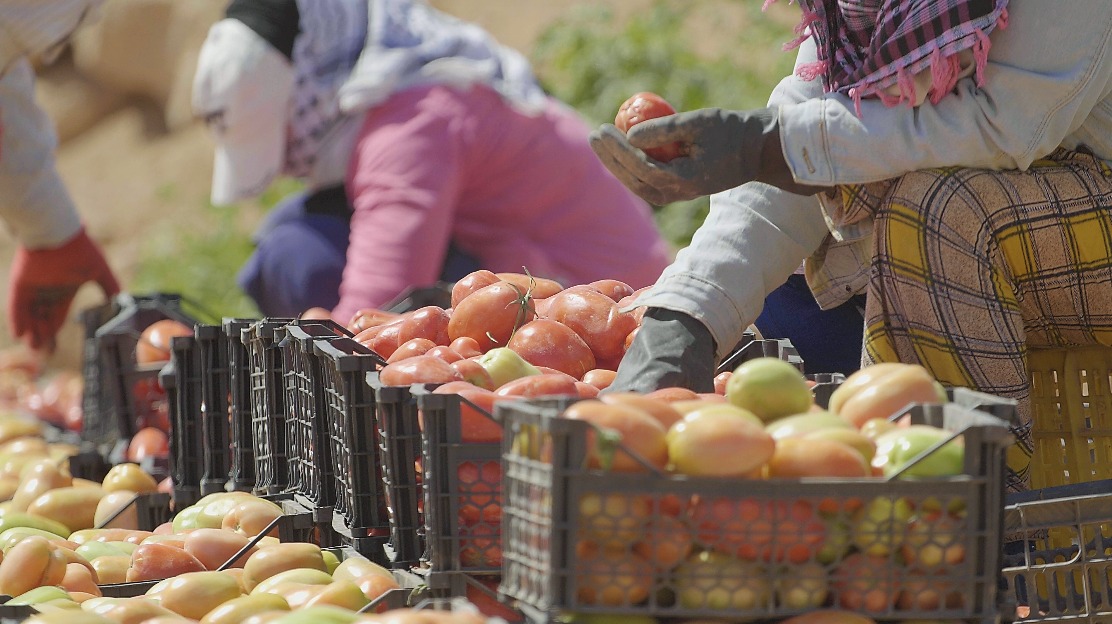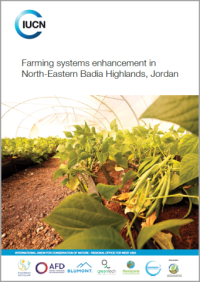In light of the contextual realities highlighted above, innovative pathways are needed to improve the livelihoods of Syrian refugees and vulnerable Jordanians in the agricultural sector through holistic support related to technical, business, and labour conditions at the level of farms (including livestock farms), agro-processing facilities, and HBBs. In a nutshell, Smart DESERT project aims to achieve two main outcomes in the North-Eastern Badia Highlands: increased year-round income generation in the agricultural sector and improved working conditions and labour rights in the agricultural sector. Implementation, at large, comprises three main activities, as the following:
1. Technical support to farms, processing facilities, and home-based businesses.
2. Support for entrepreneurship to improve beneficiaries’ access to regular income, through training, facilitation of partnerships, and support market linkages.
3. Improvement of working conditions
Project implemented by: IUCN (lead partner), INWRDAM, Blumont International, Horizons for Green and Greentech.
Project funded by: French Development Agency (AFD)
MAIN ACHIEVEMENTS IN 2021:
- Completion of the baseline studies
- Farming systems
- Home-based businesses (HBBS)
- Food processing facilities
- Business support incubator (BSI)
- trainings & community informative sessions
1. Completion of the baseline studies: As essential preliminary steps for implementation of interventions, 11 baseline studies were conducted covering the following topics:
- Value chain mapping
- Working conditions of the agricultural sector in Jordan
- Agro-industrial facilities
- Gender baseline
- Stakeholders’ analysis
- Crop mapping
- Socio-economic baseline
- Water use efficiency
- Wastewater treatment and reuse potential
- Hydrological analysis for water harvesting locations
- Saline water resources
2. Farming systems:
- Rehabilitation of 26 low-output farmlands through replacement of deteriorated irrigation system components such as irrigation pipes, greenhouses, filtration systems, fertigation units, and water storage ponds, as well as, create new job opportunities. Rehabilitation interventions also comprised installation of climate-smart agricultural techniques and tools such as hydroponic systems and root zone sensors for sustainable irrigation management. At large, rehabilitation will considerably expand cultivation.
- Establishment of 2 demonstration sites to function as a farmer field school. Training topics comprise automated irrigation systems, hydroponics, and aquaponic food production systems. In addition, state-of-the-art sustainable agricultural practices for climate-resilient farming systems are also essential topics in the farmer field schools. These practices include but are not limited to protected cultivation of trees, usage of volcanic tuff instead of plastic mulch (for conserving the soil’s moisture), and cultivation of salt-tolerant crops.
- Excavation of two water harvesting ponds with a capacity of 10,000 m³ each.
3. Home-Based Businesses (HBBs)
- Provide technical support and training to 160 Home-Based Businesses (HBBs), including facility set-up, quality control measures, health and safety, and processing best practices.
- Provide technical support for 5 cooperatives that are specialised in labour rights and working conditions.
4. Food Processing Facilities
- Establishment of silage processing facility next to an existing wastewater treatment plant.
- Rehabilitation of 7 processing facilities to enhance the quality of the products, and increase number of job opportunities.
- Improving the energy efficiency for 5 processing facilities through conducting energy audit and installation of solar energy systems.
5. Business Support Incubator (BSI)
A project-related company was established to act as an intermediary between project beneficiaries and market buyers; Smart DESERT company or BSI is basically a “spin-off” of Smart DESERT project. Any profits made by the company to be reinvested into activities that benefit project beneficiaries. BSI will provide legal, technical, and business support for farmers, processing facilities, HBBs, and farm workers.
6. Trainings & Community Informative Sessions
Stakeholders’ participation is considered pivotal since the very beginning of the Smart DESERT project. Training workshops, advocacy sessions, field training, and community informative sessions were conducted covering a variety of topics. Altogether, through the training sessions and field visits, the following topics were covered:
- Advocacy skills
- Planning and feasibility studies of HBBs
- Field visits to successful HBBs locations
- Field training on small-scale farming activities for HBBs
- HBBs formulisation and business development
- Labour rights and working conditions’ improvement
- On-farm trees best practices
- Feeding management of sheep and goat and sheep lambing
- Harvesting of table olives
- Beehives management


